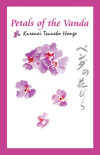
Petals of the Vanda
By Kurenai Tsuneko Hongo2005, 122 pages, paperback.

 |
Petals of the VandaBy Kurenai Tsuneko Hongo2005, 122 pages, paperback. |
ORDER -- Item #3271, Price $14.95
Kurenai (her pen name which means crimson in Japanese) was a well-educated young lady that never lost her passion for poetry even though she lived most of her life in the small town of Hilo. In her later life, after her kids had grown, she rekindled her interest in tanka poetry.
Tanka (also known as waka) is an ancient Japanese poetry form, written in 31 syllables, and is similar to the more popular haiku poetry. Tanka and haiku are the ultimate minimalist forms of writing. At their best, they are both spontaneous and precise in capturing the writer's depth of feeling. Kurenai became a master of this art. Until now, few people beyond her friends and family knew of her great talent.
With the release of this book, you'll discover the beauty, joy, sadness, and faith that were a part of Kurenai's life.
For visitors and expatriates of Hawaii, this book's imagery, captured in the poems, will forever remind you of the beauty and wonder of the islands.
For those still living in Hawaii, Petals of the Vanda will make you appreciate all that surrounds you.
It was great to be able to read this collection. She was really quite a woman and a wonderful poet."
"All I could think of was Wow. Especially interesting are Kurenai's experiences of Hawaii's transformation from when she arrived in 1911. In the more than half-century that she lived in the Islands, she witnessed its transformation and creates a still-life of the past.
When she writes of things Hawaiian in the tanka form, I can't help but consider the biculturalism she lived, of the rich Japanese heritage she remembered far away and the immediate tropics filling her senses...
Kurenai's love for her art brings happiness to us all and will live on with this book."
Petals of the Vanda comes as a marvelous revelation and verse letter from the past. It is the collection of tanka from Kurenai, the pen-name of my own grand-aunt Tsuneko Hongo, and commemorates a worthy life full of joy, reflection, and a love for poetry.
Celebrated are ephemeral and yet glorious moments of daily life-the arrival of a bunch of flowers from her sons far away, holding in her hands the face of an old friend, an article in the local paper mentioning that a grandchild has just won a prize, and many scenes of travel to Japan and California and homecomings to Hilo.
Throughout, there is the classic elegance of expression inherent in the language of the tanka, an older form than the haiku and more dignified, even restrained, capable of rendering delicate emotions, fleeting moods of wonder and delight, great sadness.
I was very moved and delighted by the collection's sentiments and forms, reading the Japanese out loud to myself, marveling at its sophistication and discipline, its care for allowing words to fall in just the right rhythms. I love tanka, and I love these even more because of all the connections to Hawaii, our common past, and the new diasporic culture that generation was building. I find the poems tender and full of humanity, a love of family and community, appreciations of nature. They strike me as very "Japanese" and representative of a hopeful, momentous time in our past. They are like the turning of colors on the petal of a plumeria blossom-white to brilliant crimson-unforgettably graceful and beautiful.
Book Description From the Flap on the Front Cover
In 1911 Kurenai Tsuneko Hongo left her native Japan and made Hawaii her new home.
Comments From the Flap on the Back Cover
"I was very moved and delighted by it (Petals of the Vanda), reading the Japanese out loud to myself, marveling at its sophistication and discipline. Its care for allowing words to fall in just the right rhythms. I love tanka, and I love these even more because of all the connections to Hawaii, our common past, and the new diasporic culture that generation was building...
- Garrett Hongo, Author of Volcano: A Memoir of Hawai`i
- Margo King-Lenson, Author of Pacific Voices: Talk Story v1-3
From the Book's Foreward
Garrett Hongo, Author of Volcano: A Memoir of Hawai`i
About |
Contact |
New |
Specials |
Browsing |
Ordering |
Conference |
Links |
Help
Copyright © 2004 by AACP, Inc.
Most recent revision December 31, 2004